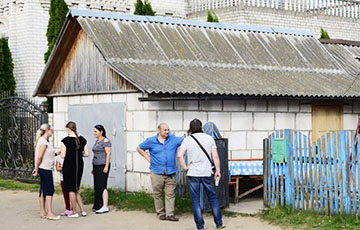The Police Officer Tells How Roma Are Persecuted in Mahiliou
- 27.05.2019, 15:53
- 3,342

The MIA has an unofficial program for the Roma.
A former Mahiliou police officer told Svaboda about an unofficial program regarding Roma. A study by Romaintegration public initiative confirms this fact. According to them, 80% of Roma in Belarus have experienced detentions and multiple fingerprinting.
"The programme concerns only Roma. They are checked, "shaken down".
On May 21, 67-year-old Lidzia Yurchenko died in the Roma district of Chapaevka in Mahiliou. Relatives believe the police raid caused the untimely death. After the murder of police officer Jauhen Potapovich, Mahiliou police searched all the Roma houses in Mahiliou and detained about 100 men.
Former policeman Mikhail from Mahiliou told Svoboda that the police had a special interest in Roma for a long time. Two Romani districts - Hrebenevo and Chapaevka are constantly subject to inspections.
"At 6 a.m., the traffic police cordon off Hrebenevo and start checking all Roma," said Mikhail.
He himself participated in this. Passports are checked, some people are detained to take fingerprints. Although most Roma have long been fingerprinted.
According to Mikhail, only Roma districts are subject to such activity of the police. He means an unofficial program of the MIA.
"Protocols are drawn up. If there is nothing, they draw up the protocol under Article 17.1 (foul language) or unsanitary," Mikhail says.
Research: 80% of Roma in Belarus have been detained
Roma in all regions of Belarus talk about discrimination on the part of the police.
Last week the Romaintegration public initiative presented a report "Social and Economic Situation of the Roma Population of Belarus" (the document is prepared jointly with the Lithuanian Center of Expertise in the Field of Equal Rights). During the monitoring 814 people from all regions of Belarus were interviewed.
"80% of respondents faced ethnic profiling in the form of detentions, multiple fingerprinting, confiscation of vehicles," the study says.
Ethnic or racial profiling is a practice when police officers use race, colour, descent or national (ethnic) origin as an excuse to identify individuals as a group. These groups are subject to increased "preventive" or other actions, the report explains.
"At one time, all Belarusians were subjected to fingerprinting. I don't understand why the Roma still face this procedure," Artur Homanau, head of the public organization "Belarusian Roma Diaspora", says.
According to him, at least five times a year every person from the Roma community is detained for fingerprinting. But the police do not explain reasons.
According to the representative of the Belarusian Helsinki Committee, Dzmitry Chernykh, there are special instructions for police officers.
We know about the internal order," Artur Homanau says. - I guess it's No. 56. But I don't know whether it concerns the Roma or all the people who have a dark skin color.
"Roma Are Extremely Scared"
Belarusian human rights activists drew attention to the violent detention of Roma. Chairman of the HRC Viasna Ales Bialiatski asks the Prosecutor General's Office to verify the legality of detentions of Roma on May 16 and take necessary measures.
The human rights activist calls for "a careful consideration of unjustified cases of physical violence".
In its report, Romaintegration initiative recommends the Interior Ministry to stop all forms of ethnic profiling.
Svaboda wrote, the Romani diaspora is talking about an increased pressure on the part of the police over the past 5-6 years and associate it with a change in the leadership of the Interior Ministry.
The situation has deteriorated when Minister Shunevich took his position.
According to Artur Homanau, international organizations consider the case of mass arrests among the Roma. The Roma themselves, who have suffered from the actions of the police, in most cases refuse to verify battery-induced injuries, as they are afraid of even greater persecution.
Roma are extremely scared," Gomanau says. - I cannot predict future actions. I don't know, people may leave this country".









